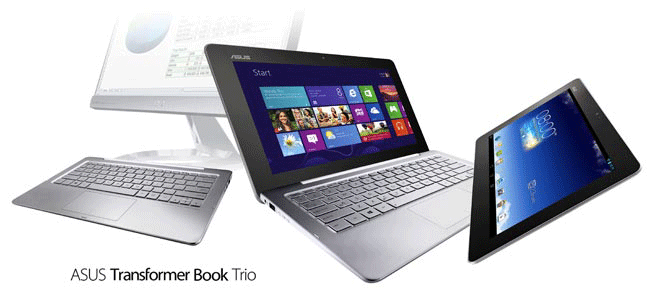Hybrid devices are not a new thing but they seem to be one of the big items that ASUS was announcing at Computex. Part of the Transformer lineup, the Transformer Book Trio can function as a tablet, laptop or even a desktop. In addition to this, it also has the ability to run either Windows or Android on the same device. So, is this really a new computing device or just having separate items with a bit of interaction?
Hardware
The Transformer Book Trio at first glance would look very much like past Transformer hybrid devices: a tablet that also features a keyboard docking unit. What is different in this case is the keyboard dock is much more than just a keyboard, battery and a few additional ports. In this case, it is referred to as a PC Dock because the unit has a new Intel Core i7-4500U series processor, traditional hard drive, battery pack and keyboard. The only downside here is that it won’t function as a standalone PC on its own (even though it has practically all the necessary features).
The 11.6-inch tablet portion will feature an Intel Atom based processor along with 64GB of storage so that it can function on its own without the dock. With the dock attached, it then can function as a traditional laptop system with its processor taking over the workload for additional performance. If the user then wishes to use it as a desktop, then they can plug a display into the tablet and have it run on an external display. Frankly, I don’t see how that is a desktop mode as it is no different than just plugging any laptop into a display.
Software
Of course the other major selling point for this device is the ability of the it to run both the Windows 8 operating system and Android. Now the reality is that the tablet functions as an Android device while the dock functions as a Windows machine. What work you were doing in one should automatically switch over to the other operating system. For instance, viewing a web page or watching a movie would switch over to the appropriate applications between the two operating systems. Now, this would not necessarily be true for all cases as there isn’t always a corresponding application.
My question is is this something the consumer really want or need? I can understand wanting to have the two but why on the same device? After all, many people now carry a smartphone in addition to a mobile device, either a tablet or laptop. Why not just have a standard Windows based laptop or tablet device and an Android smartphone? I guess there may be some benefits to the Android operating system providing longer running times or additional entertainment options but it seems silly.
The Unknowns
As a concept, the device certainly has some potential but there are a lot of things that ASUS left out in their product announcement. Here are just a few of the ones that come to mind:
- Pricing – ASUS failed to mention a price range for this product but I’m certain it will be much more than their new Transformer Pad Infinity announced at the event since this has additional hardware built into the PC Dock. My guess will likely be somewhere between $700 and $1000. That is based upon the cost of a low cost ultrabook plus a tablet which this produce essentially duplicates.
- Tablet Storage Space – With the tablet portion having 64GB of space, how is it going to handle moving data between the two different operating systems when it is switched. After all, if you are writing a document on one and it can switch between the two, then the file must be stored on the two. Also, how would it properly deal with the two files when the tablet and dock are connected again?
- Will Switching Modes Be Smooth? – Docking and undocking the unit and switching between the two operating systems is implied as a quick and smooth affair. As touched upon in the storage, how well will it be able to translate application data between the two or will it only do this for the web browser, mail and video?
- Battery Life – Tablet computers have extended our expectations for how long a device will run on a charge. The Atom processors can be quite good for running time but will be be as long as other tablets.
Without these questions answered, it is hard to say how the product will fare in the marketplace. Share your thoughts on it in the comments.


Hybrid computers seem like a good idea, but then they turn out to be just barely as good as high quality separate devices.
That Transformer pad has amazing specifications and that built in HDD in the dock keyboard module is amazing!
Pingback: Razer's Concept Modular Desktop And Mobile PC Gaming Device | Tech for Anyone
Pingback: No Windows and Android In A Single Device | Tech for Anyone